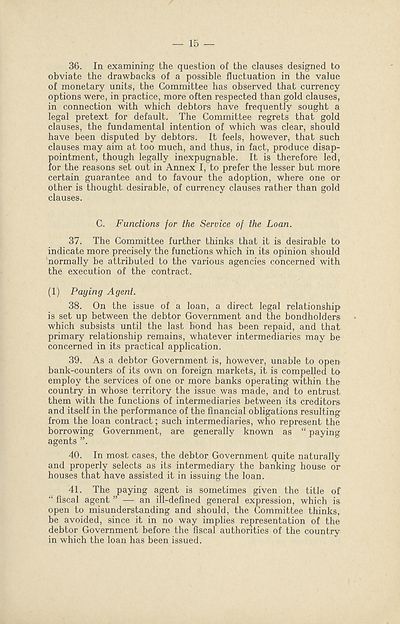Economic and financial section > Report of the Committee for the Study of International Loan Contracts
(17)
Download files
Complete book:
Individual page:
Thumbnail gallery: Grid view | List view

— 15
36. In examining the question of the clauses designed to
obviate the drawbacks of a possible fluctuation in the value
of monetary units, the Committee has observed that currency
options were, in practice, more often respected than gold clauses,
in connection with which debtors have frequently sought a
legal pretext for default. The Committee regrets that gold
clauses, the fundamental intention of which was clear, should
have been disputed by debtors. It feels, however, that such
clauses may aim at too much, and thus, in fact, produce disap¬
pointment, though legally inexpugnable. It is therefore led,
for the reasons set out in Annex I, to prefer the lesser but more
certain guarantee and to favour the adoption, where one or
other is thought desirable, of currency clauses rather than gold
clauses.
C. Functions for the Service of the Loan.
37. The Committee further thinks that it is desirable to
indicate more precisely the functions which in its opinion should
normally be attributed to the various agencies concerned with
the execution of the contract.
(1) Paying Agent.
38. On the issue of a loan, a direct legal relationship
is set up between the debtor Government and the bondholders
which subsists until the last bond has been repaid, and that
primary relationship remains, whatever intermediaries may be
concerned in its practical application.
39. As a debtor Government is, however, unable to open
bank-counters of its own on foreign markets, it is compelled to
employ the services of one or more banks operating within the
country in whose territory the issue was made, and to entrust
them with the functions of intermediaries between its creditors
and itself in the performance of the financial obligations resulting
from the loan contract; such intermediaries, who represent the
borrowing Government, are generally known as “ paying
agents ”.
40. In most cases, the debtor Government quite naturally
and properly selects as its intermediary the banking house or
houses that have assisted it in issuing the loan.
41. The paying agent is sometimes given the title of
“ fiscal agent ” — an ill-defined general expression, which is
open to misunderstanding and should, the Committee thinks,
be avoided, since it in no way implies representation of the
debtor Government before the fiscal authorities of the country
in which the loan has been issued.
36. In examining the question of the clauses designed to
obviate the drawbacks of a possible fluctuation in the value
of monetary units, the Committee has observed that currency
options were, in practice, more often respected than gold clauses,
in connection with which debtors have frequently sought a
legal pretext for default. The Committee regrets that gold
clauses, the fundamental intention of which was clear, should
have been disputed by debtors. It feels, however, that such
clauses may aim at too much, and thus, in fact, produce disap¬
pointment, though legally inexpugnable. It is therefore led,
for the reasons set out in Annex I, to prefer the lesser but more
certain guarantee and to favour the adoption, where one or
other is thought desirable, of currency clauses rather than gold
clauses.
C. Functions for the Service of the Loan.
37. The Committee further thinks that it is desirable to
indicate more precisely the functions which in its opinion should
normally be attributed to the various agencies concerned with
the execution of the contract.
(1) Paying Agent.
38. On the issue of a loan, a direct legal relationship
is set up between the debtor Government and the bondholders
which subsists until the last bond has been repaid, and that
primary relationship remains, whatever intermediaries may be
concerned in its practical application.
39. As a debtor Government is, however, unable to open
bank-counters of its own on foreign markets, it is compelled to
employ the services of one or more banks operating within the
country in whose territory the issue was made, and to entrust
them with the functions of intermediaries between its creditors
and itself in the performance of the financial obligations resulting
from the loan contract; such intermediaries, who represent the
borrowing Government, are generally known as “ paying
agents ”.
40. In most cases, the debtor Government quite naturally
and properly selects as its intermediary the banking house or
houses that have assisted it in issuing the loan.
41. The paying agent is sometimes given the title of
“ fiscal agent ” — an ill-defined general expression, which is
open to misunderstanding and should, the Committee thinks,
be avoided, since it in no way implies representation of the
debtor Government before the fiscal authorities of the country
in which the loan has been issued.
Set display mode to:
![]() Universal Viewer |
Universal Viewer | ![]() Mirador |
Large image | Transcription
Mirador |
Large image | Transcription
Images and transcriptions on this page, including medium image downloads, may be used under the Creative Commons Attribution 4.0 International Licence unless otherwise stated. ![]()
| League of Nations > Economic and financial section > Report of the Committee for the Study of International Loan Contracts > (17) |
|---|
| Permanent URL | https://digital.nls.uk/190547511 |
|---|
| Shelfmark | LN.II |
|---|
| Description | Over 1,200 documents from the non-political organs of the League of Nations that dealt with health, disarmament, economic and financial matters for the duration of the League (1919-1945). Also online are statistical bulletins, essential facts, and an overview of the League by the first Secretary General, Sir Eric Drummond. These items are part of the Official Publications collection at the National Library of Scotland. |
|---|---|
| Additional NLS resources: |
|

